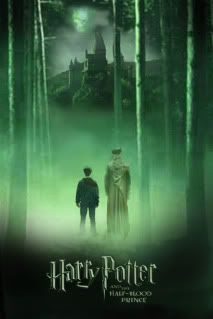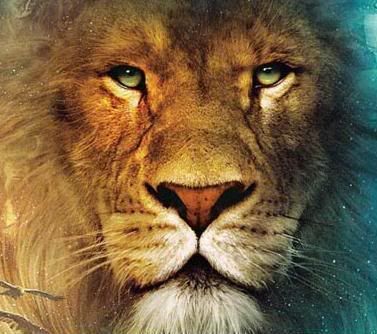
When I see and review movies that are adapted from books I've read, I try not to get wrapped up in the similarities and differences, because I think doing so can ruin the cinematic experience by distracting from the movie, which often must tweak the story to translate it to the big screen. Having said that, this review is a bit of an exception, because many of the weaknesses of the movie are precisely the strengths of the book. That may not be entirely fair to the movie, but so be it...
Harry Potter and the Half-Blood Prince (HPHBP) is the story of Year Six at Hogwarts, where our trio of heroes returns to school as a strengthening Lord Voldemort and his army of Death Eaters begin to wreak havoc on both the wizarding and Muggle worlds.
Getting right to the point, the movie's primary problem is that nothing drives the story. The book is propelled by three main questions: What is Draco up to? Who is this Half-Blood Prince whose book Harry possesses? Why is Dumbledore showing Harry the various memories? These three interwoven storylines, combined with a side of romance, effortlessly carry the book through its 700+ pages, sprinting to the finish in an absurdly entertaining final five chapters. But the movie mishandles these three major questions and fails to carry much of this palpable drama to the screen.
In the movie, the answer to the first question is made apparent to the viewer early in the movie. The main characters don't learn the answer, but the audience does, an odd cinematic choice that deprives the narrative of its usual protagonist-based power. The second question is a continuing arc that is given short shrift throughout, to the extent that when the riddle is answered in the final moments, it's merely an "Oh."-inducing throwaway line rather than a "Wow!"-inducing culmination of 2+ hours of mystery. The final question does move the movie along somewhat, but the numerous omitted memories rob Voldemort of his explanatory traits, as well as Dumbledore of his motives. Voldemort thus feels like a typical two-dimensional villain rather than the vortex of evil he ought to be, and Dumbledore seems to be more of an uncertain guide instead of a presciently powerful wizard. As for the romance angle, those scenes are executed well enough, including a few poignant teen moments, but neither one of the potential pairings seems fully fleshed out. They don't necessarily feel wrong, but they do feel inadequately supported.
On the bright side, the highlight of the HPHBP is undoubtedly its not-so-bright look. With its washed-out appearance that borders on black-and-white at times, this colder version of Hogwarts is an appropriately stark contrast to the warm and cheery home portrayed in the first two films. But aside from the look, which accurately expresses what the tone ought to be, given the lurking evil, the tone itself doesn't match.
The best part of Order of the Phoenix was the way that director David Yates captured the spirit of the book, effectively displaying the magical and dangerous wizarding world yet also taking time to show smaller moments of laughter and friendship, which were to be treasured as the dark times approached. Yates is not nearly as effective in HPHBP. The vivacity is largely absent, and while some of that is understandable due to the nature of the events, it's still a world of magic. Too often the movie seems to forget that. I will say that the cave scene in the final act is quite magical and quite good, though still a bit rushed. Finally at that point the movie seems to have a purpose, even if it isn't entirely clear what that purpose is.
Without the aforementioned compelling story arcs or the brisk pace of OOTP, the film meanders throughout, running in place for two and a half hours and failing to build momentum as the narrative leaps between arcs, as though not sure where to go while killing time until the climactic final movies. Despite this, the 150 minutes rarely seem to drag, which speaks to the potency of the source material and the attachment that book readers have to the characters.
In the end, the movie's focus is shallow and wide, rather than deep and narrow, leaving the entire work feeling weak, like there wasn't enough of everything. The danger never felt real enough. Dumbledore wasn't confident or wise enough. Harry wasn't eager enough to figure out where Dumbledore was leading him. And a certain late scene, which is the most jaw-dropping in the entire seven-book series, is shockingly underplayed. The result is an experience that satisfies marginally, leaving this Potter fan disappointingly underwhelmed.
(Though I haven't spoken to anyone who has seen the movie without reading the book, I suspect that those people would enjoy the movie less, not entirely understanding many parts and being confused by multiple short scenes that seem included merely to satisfy fans.)
Bottom Line: Harry Potter and the Half-Blood Prince is the penultimate book, with a superb story that aggressively drives toward the inevitable showdown between good and evil. Harry Potter and the Half-Blood Prince is also the antepenultimate movie, with a weakened story that gradually wanders toward a lukewarm conclusion. 6 of 10, only that high because I already had the true power of the story ingrained in my head.
P.S. I'm slightly terrified that David Yates is also directing the last two movies. I hope he doesn't ruin them.
P.P.S. Why wasn't Felix Felicis gold in color? I don't understand why moviemakers screw up simple-yet-obvious things like that.
